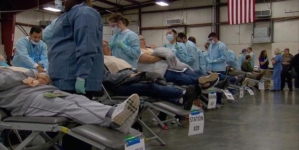-
How to Watch Edmonton Elks vs BC Lions: Live Stream CFL, TV Channel - 16 mins ago
-
DraftKings UFC Promo Code: Claim Bet $5, Win $300 Bonus For UFC 316 Card - 55 mins ago
-
Red Sox's Romy Gonzalez cranks two-run home run to extend lead over Yankees - 58 mins ago
-
Miguel Uribe, leader of Colombian right opposition, shot in Bogota - about 1 hour ago
-
Trump’s Pardon Spree May Not Be Over Yet: What to Know - 2 hours ago
-
LIV Golf Virginia: Anirban Lahiri charges to lead after stellar 64 in Round 2 - 2 hours ago
-
Toys caught in the crosshairs of Trump’s tariffs - 2 hours ago
-
Who Are the Suspects Charged in North Carolina Deadly Mass Shooting? - 2 hours ago
-
Miley Cyrus stuns in sheer crystal dress at New York film festival - 2 hours ago
-
Sovereignty wins 2025 Belmont Stakes, third and final leg of Triple Crown - 2 hours ago
A majority of Americans believe flying is a mostly safe mode of transportation and rate the overall safety record of commercial airline travel positively.
America’s more frequent flyers are especially likely to call flying safe.
People who say they never fly in a typical year — about half the public — are comparatively less likely to feel it is safe.
Overall, seven in 10 Americans feel flying is very or somewhat safe. Bigger majorities feel this way about trains, buses and driving, boosted in part by the views of “never” flyers who rate these modes of transportation as safe in higher numbers than they do flying.
Most Americans rate the overall safety record of commercial air travel positively — as either excellent or good. Today’s ratings are largely on par with those in 2014, when CBS News last asked about this, weeks after the disappearance of Malaysia Airlines Flight 370.
The CBS News poll has often asked about people’s views of flying after air travel incidents. We have seen ratings of commercial airline safety sometimes dip after such instances, but they have remained majority positive.
This CBS News/YouGov survey was conducted with a nationally representative sample of 2,351 U.S. adults interviewed between March 24-26, 2025. The sample was weighted to be representative of adults nationwide according to gender, age, race, and education, based on the U.S. Census American Community Survey and Current Population Survey, as well as 2024 presidential vote. The margin of error is ±2.5 points.
Toplines

































